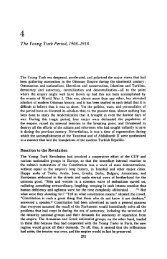Governing property, making the modern state - PSI424
Governing property, making the modern state - PSI424
Governing property, making the modern state - PSI424
You also want an ePaper? Increase the reach of your titles
YUMPU automatically turns print PDFs into web optimized ePapers that Google loves.
Citing Ebussuud to <strong>the</strong> effect that all contracts (mu‘amalat) are invalid without<br />
<strong>the</strong> permission of <strong>the</strong> sibahi, al-Hamzawi <strong>the</strong>n interprets this phrase in a decidedly<br />
more nineteenth-century fashion as not governing those ‘revocable (ghair lazima)<br />
contracts such as sharecropping, rental, loan, deposit and entrusting’. 64 According<br />
to al-Hamzawi, <strong>the</strong> logic behind this list of exceptions is that <strong>the</strong> haqq al-qarar<br />
is not transferred <strong>the</strong>reby from one person to ano<strong>the</strong>r unlike <strong>the</strong> contracts of<br />
legacy, marital alimony, gift, pledge (rahn), waqf, badal sulh and sale. Al-Hamzawi<br />
is aware that he is forcing matters with this reading: <strong>the</strong>reafter he turns to <strong>the</strong><br />
judgment of al-Ramli prohibiting unilateral partition, sharecropping and rental,<br />
as well as that of al-Hanuti prohibiting subletting on <strong>the</strong> analogy of sukna in<br />
waqf proper. 65 Al-Hamzawi gets round this powerful invocation of earlier tradition<br />
by a legal genealogy that leaps from Ebussuud and Kemal Paşazade – although<br />
al-Hamzawi cites no phrase of <strong>the</strong> latter – to <strong>the</strong> Land Code, a genealogy which<br />
shows that ‘for us permission was given’ for such transactions. 66 Here al-Hamzawi<br />
comes close to suggesting an Ottoman, or even a quasi-Turkish (‘ulama’ al-Rum),<br />
genealogy as against one based on Arabic sources.<br />
Al-Hamzawi next turns to <strong>the</strong> provisions of <strong>the</strong> law concerning succession to<br />
usufructuary rights in miri land. He closes off all contestation with a <strong>modern</strong><br />
phrase: <strong>the</strong> issue is one of <strong>the</strong> kanun not of <strong>the</strong> Koran. 67 The rest of <strong>the</strong> epistle<br />
summarizes and expands <strong>the</strong> account of powers arising from haqq al-qarar<br />
before closing with a justification of <strong>the</strong> identical rules governing acquisition,<br />
disposal and devolution of usufructuary right in waqf lands created from miri<br />
land. As we have seen, a convergence of <strong>the</strong> forms of usufructuary right between<br />
miri and waqf land was not an innovation of <strong>the</strong> nineteenth century. But two<br />
innovations in <strong>the</strong> law appear to have encountered opposition in Damascus:<br />
full gender-equality in succession and <strong>the</strong> capacity of <strong>the</strong> cultivator with haqq<br />
al-qarar on waqf land to sublet. The mufti closes with <strong>the</strong> argument that it<br />
would be best if <strong>the</strong> doctrinal choice of <strong>the</strong> Commander of <strong>the</strong> Faithful [<strong>the</strong><br />
sultan] governing succession in <strong>the</strong> lands of <strong>the</strong> Muslim treasury were also<br />
applied to <strong>the</strong> lands of true waqf: <strong>the</strong>re is no prohibition against this in al-shar‘<br />
and a single mode of succession to waqf and miri lands would be more elegant<br />
and discourage disputes among <strong>the</strong> heirs. 68 Essentially this is what central law<br />
would begin to ensure as <strong>the</strong> <strong>state</strong> increasingly took waqf lands into bureaucratic<br />
administration.<br />
Al-Hamzawi’s epistle is both a <strong>state</strong>ment by a jurist of <strong>the</strong> Tanzimat and a<br />
response to arguments advanced by ulema of Damascus, who drew upon Arabic<br />
Hanafi jurisprudence to counter legal change. The strategy adopted by <strong>the</strong> mufti,<br />
an Ottoman legal genealogy that passed straight from Ebussuud to <strong>the</strong> Land<br />
Code, does not represent a well supported legal argument; ra<strong>the</strong>r like some of <strong>the</strong><br />
sixteenth-century sheikh-ul-Islam’s fetwas, it resembles an intellectual decree. The<br />
door is slammed on <strong>the</strong> more complex intellectual genealogy of Arabic Hanafi<br />
jurisprudence with its roots in <strong>the</strong> Mamluk period and before. The mufti’s aim<br />
appears to be to silence counter-arguments advanced by Syrian ulema. Perhaps<br />
such opposition lay behind <strong>the</strong> sultanic decree of 1862, on recommendation of<br />
49<br />
Legal reform from <strong>the</strong> 1830s












